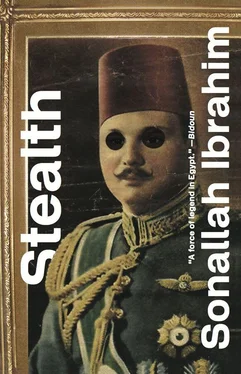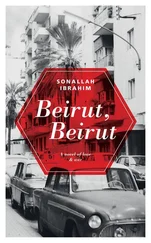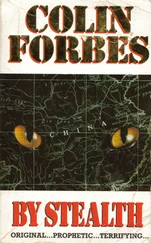I put the top back down. I take out the ships made of paper. Father has put them together with skill and ease. I carry them to the bed and stack them up. The small ships first, then the big ocean liners. I divide them into two groups face to face. Each group has its own lead vessel that you can tell from the match stick coming out of the front. The two groups go to battle and some of the ships are hit and fall over on their side. I get bored after a while.
There’s a wrapper full of Egyptian Romano cheese and another with local pastrami on the table. I tear off half a loaf of bread, and put a slice of pastrami in it. The voices of neighborhood children in the streets come through. I rush to the balcony. Children my age and younger cling to each other by their clothes, as they form a train that moves through the quarter. Their voices rise: “Throw in that coal and steam the train along.” They form a ring and one of them stands to the side. He calls out: “The fox.” They call out together in one voice: “It’s gone. Gone.” “What about its tail?” “Seven turns.” “And the lady bear?” “It fell down the well.” “And it’s owner?” “A big fat pig.” “Did the wolf get by you, the Sahlawi wolf?” “It’s gone. Gone.” He looks from the window in his square white cap, smoking a black cigarette. Cops and robbers. I play with them bravely; I’m not afraid of the others.
The voice of Ragaa Abdou comes from Um Zakiya’s radio. The sun goes down. I turn on the electric lantern. The blanket is cold. The wind rattles the door to the balcony. I take down a book in French from the row of Nabila’s school textbooks. I flip through the pages. A drawing of a man in the rain. He is covered by a wide cloak and holds an umbrella over his head. An empty street. A boat. I listen carefully.
The fall of heavy steps echoes out on the staircase. The steps stop in front of our apartment, then they continue upwards.
When is papa coming? Coming at six o’clock!
Walking or riding? Riding down the block!
He appears at the door of the apartment in his full suit with fez and carrying a paper bag in his left hand. His dark face is beaming. He leans over towards me and takes me in his arms. He kisses me on each cheek and then buries his mouth against my neck. I pull back my face to avoid his prickly moustache. I say to him: “Papa, let go.” He tickles my chin with his finger saying: “Put on your little duckling hat, chin of the kitty cat.”
Finally, his steps fall. They come up slowly as the shoes scrape across the stairs. I hear the sound of the key turning the lock of the outer door. He opens the door to our room. He comes in and turns around: “Come in, Um Muhammad.” A tall woman, so thin it’s scary, wrapped in one of the flowing black cloaks of the countryside, walks in. Her hair is covered by a black shawl. Her face is sun baked and covered with wrinkles. A long nose. Narrow eyes. She carries a big bundle under her arm. She stands in the middle of the room. He invites her to sit on the edge of the bed. She sits down, keeping her two feet flat on the floor. Black stockings and very old black shoes with low heels. She sets the bundle next to her on the bed. She won’t look at either one of us.
Father takes off his overcoat and hangs it on the rack. He says to her: “Come along so I can show you the apartment and let you change your clothes.” She takes her bundle in her hand and follows him to the living room.
“The toilet’s there. Its door doesn’t close all the way. The toilet is broken. You can change your clothes in the guest room.”
He leaves her and comes back. He takes off his jacket and puts a robe on over his waistcoat and slacks. He leans over the bed. He takes out a bag of vermicelli and a jar of sugar. “Do you want some vermicelli with milk?” I don’t answer. When he leaves the room, I hear the muffled sound of the stove, then the rustling of the fire. The sizzle of the butter. He comes back after a while scowling. “The milk’s gone bad.” Um Muhammad comes in wearing a black dress. She is wearing thick black socks and the bundle is still under her arm. She puts it on the bed and sits on the edge. From the bundle she pulls a miniature pack of cigarettes and takes out a flat one. Father wrinkles his brow. He hands her a box of matches without saying anything. She lights her cigarette. Father brings the pot of vermicelli. She says she’s not hungry. He and I eat it with just sugar since there is no milk.
He suggests that she stretch out on the bed if she’s tired. She doesn’t answer. He tells her: “Um Muhammad, you and I are fully married according to God’s law and the order established by His prophet.” She stands straight up, then climbs on to the bed. She takes over my place next to the wall. When I set myself down next to her, I smell a strong odor of dirt or mud. Her legs knock against the frame of the bed. She folds them up and her hard knees knock against me. I move away from her toward the edge of the bed. Father turns off the light and lies down next to me. I cling to him, surrounding him with my arms.
Maged Effendi shows up in the doorway of the shop. He wears a three-piece suit with no overcoat. His suit is neatly pressed. His face shines in the light of the electric lamp. His sunken forehead has a line of carefully combed, black hair at the top. His ears stick out. Everyone welcomes him in. Abdel ‘Alim cries out: “Welcome to the groom!” The groom smiles proudly. Father asks him: “Did you really marry a genie?” He pulls me by my arm to let him have the chair I’m in. I stand between father’s knees as Maged Effendi sits in my place.
Everyone’s eyes are fixed on him. The turbaned sheikh is there in his jubbah and caftan. So is Refaat Effendi with a copy of today’s Al-Masri folded up in his hand. Father asks again: “How are things?” Maged Effendi thinks for a second, then says: “Like any marriage.” Abdel ’Alim cries out: “Are you kidding? Tell us all about it. But first, what are you drinking?” “Fenugreek tea, with milk.” Abdel ’Alim calls to Abbas, who is standing on the porch of the shop and tells him to bring fenugreek.
Maged Effendi says that she was the one who had asked him to marry her, but on the condition that he never take a second wife and that he never eat garlic or onion at night. Father comments: “She’s right on that point.” Maged Effendi keeps going and says that he has to admit she has her good points. She helps him out with money when he’s short and when he comes back home at the end of the day, she has dinner ready for him, including all kinds of fruit, even if they’re not in season. The house stays clean, and his clothes are always washed.
“So what are you mad about?”
He says he cannot control her, that she pops up whenever he thinks of her, then just as suddenly, disappears whenever she feels like it. She reads his mind before he even has a thought, making it impossible to keep any kind of secret from her.
The fenugreek tea arrives and he takes a sip. Abdel ’Alim leans over and whispers in his ear. He answers back: “Beyond your wildest dreams.” Then he turns to everyone and says: “She does whatever it takes to make me happy and keep me from getting tired of her.” Some nights, she even asks him what type of woman he wants, then she takes that shape on to herself. This time a blonde foreigner in a bikini, that time a belly dancer that looks just like Tahia Karioka, and the next time in a short tartan skirt, like a student just back from school.
Silence surrounds the group. A woman comes in wearing a black wrap. She turns her back to us and asks Saleem for 50 dirham worth of halva. Everyone turns around to look at her. Her wrap clings tightly around her and the lower part of her leg shows from underneath it. Father’s look fixes on her full, bare calf. He loosens his coat and puts his hand in the watch pocket of his waistcoat. He lifts his left hand to his mouth and brushes his finger across his moustache as he exchanges a smile with Hajj Abdel ’Alim.
Читать дальше












